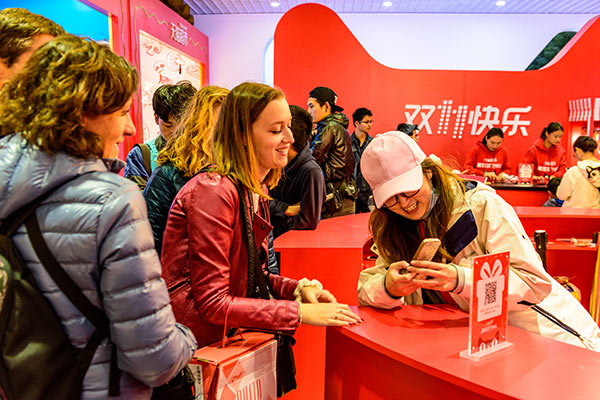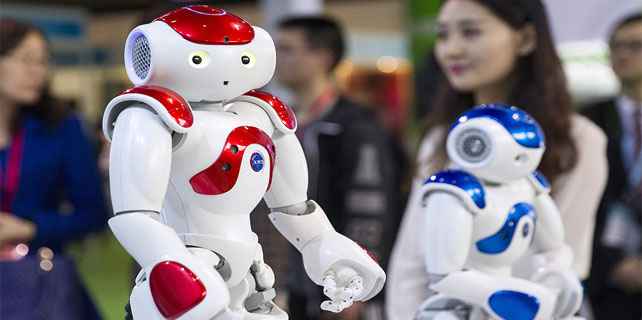Strictly Single with an army of suitors
 |
|
Visitors are drawn to a promotional event for the Singles Day shopping festival in Shanghai.WU JIANDE/CHINA DAILY |
A decade ago, Nov 11 was just another date in the calendar unless it was your birthday.
Even in 2009, it hardly created waves when it became known as Singles Day.
For Wang Lingjing, vice-general manager of Shanghai Duowei Commercial Co Ltd, it was nothing to get excited about.
"Initially, just 27 merchants signed up for the event, promising to halve prices and raise awareness of online shopping, which was still a rarity in China," she said.
Fast forward eight years and Singles Day is "too big to ignore" even for Wang and the cosmetic company she works for.
Duowei and its 50-strong staff have stocked products worth millions of yuan just for Nov 11 and the millions of customers looking for bargains.
"Pre-orders have been brisk," Wang said.
From its humble beginnings, Singles Day has morphed into a 24-hour spending extravaganza and an unparalleled marketing opportunity for brands to expand their customer base.
In short, it is the largest online shopping day in the world, and the brainchild of Alibaba Group Holding Ltd.
Last year, on Nov 11, 120.7 billion yuan ($18.2 billion) was spent on the group's various platforms from 100,000 brands.
Incredibly, that was a staggering 2,000-fold increase from 2009, and triple the spending power of Black Friday and Cyber Monday combined in the United States in 2016.
But then everything about this retail jamboree is quirky. The phrase Singles Day derived from an internet joke to celebrate singletons on Nov 11, which was written in the form of four "1s".
"It was a smart gimmick by Alibaba to arouse the kind of psychological comfort zone needed by bachelors through online shopping," said Neil Wang, president of consultancy Frost & Sullivan Greater China.
"It has become a shopping celebration," he added.
Adam Xu is a partner with Strategy&, which was formerly Booz & Co but is now a consultancy subsidiary of PwC, or PricewaterhouseCoopers, a multinational professional services network.
He agreed with Wang's view, insisting that the event has become a "social phenomenon".
"It is just like in the old days when department stores hosted promotions during Chinese New Year or National Day holidays," Xu said. "Nov 11 is core to today's commerce."
As a curtain raiser to Singles Day, Alibaba announced its full lineup of shows and bargains in Shanghai last month.
Daniel Zhang, the group's chief executive officer, promised promotions on more than 15 million products from 140,000 brands through its marketplace platforms.
These figures are hardly surprising when you consider Alibaba's ambition is to serve 2 billion customers in two decades.
The sheer size of China's e-commerce industry is staggering since Nov 11 was rolled out nine years ago.
"It already eclipses the US as the largest online retail market and by 2020 it is expected to generate online retail sales worth $2.42 trillion," research firm eMarketer stated.
Even though Alibaba has trademarked Singles Day, e-commerce rivals JD.com, Amazon.com and NetEase's overseas shopping sites are likely to take a slice of the action.
Consultancy Frost & Sullivan has predicted that this year's event will see gross merchandise volume reach 150 billion yuan, a rise of 24.3 percent year-on-year.
This is remarkable when you consider that online discounting has become normal in China.
Yet in a survey conducted by data and information company Nielsen, nearly 80 percent of those polled said they were still intrigued by the annual Nov 11 promotion.
Many revealed that they were keen to try out new items instead of simply bagging a bargain, Tommy Hong, vice-president of Nielsen China, pointed out.
"Competition will make it harder for Alibaba, but it will add to the excitement of the overall 11.11 festival," said Richard McKenzie, a partner at consultancy Oliver Wyman in Hong Kong.
Apart from the scale of Singles Day, one feature which will set this year's event apart is the O2O, or online-to-offline shopping.
Back in 2009, the term had not even been coined, but now it is big business.
Initiatives will include converting nearly 100,000 outlets across China into "smart stores" to cater for facial-recognition payments, and scan-and-deliver shopping to customers.
Alibaba's Tmall has also teamed up with major brands, such as French luxury cosmetics label Lancome and Beats Electronics, a subsidiary of Apple Inc, to set up 60 "pop-up" stores across 12 cities.
Consumers will be able to experience an augmented-reality, or AR, lipstick trial in-store before buying the discounted item online.
"Rather than confrontation, online and offline sales require conversion, making such dichotomy de facto obsolete," said Stephane Rinderknech, China CEO of cosmetics giant L'Oreal Group, which will roll out AR-powered stores on Singles Day.
"China is showing the way for the rest of the world, in terms of beauty sophistication, as well as e-commerce and the level of digital connectivity," he added.
Alibaba is certainly exploring the technological frontier by unveiling new forms of retail and customer engagement.
Tmall, for example, organized a runway show featuring major brands such as Adidas, Estee Lauder and Victoria's Secret.
The event was broadcast across several media platforms to give customers an early glimpse of what is in store on Nov 11.
Viewers who were interested in any of the products on show could shake their smartphones to bring them up on their screens.
"These are just the extended tentacles of a technology powerhouse, whose ecosystem now includes online payments, logistics, artificial intelligence and cloud computing," said Yang Yaqiong, senior analyst at consultancy Analysys in Beijing.
Still, despite the buzz and the flashy ads, customers and brands are starting to have mixed feelings toward the shopping party compared to a few years ago.
A major issue lies in the complexity of some of the promotions.
Many require down payments, or the need to redeem virtual discount coupons, that would put off even the most avid bargain hunters.
Customers are also encouraged to place a deposit at least three days ahead of the actual sales to claim a substantial discount.
A 100 yuan deposit will result in a 150 yuan discount or more when the transaction is processed on Singles Day.
Other shopping sites have come up with cash incentives hidden in virtual red packets.
"Even if you don't mind being tethered to your laptop for that 50-yuan discount coupon, online traffic can overwhelm sites during peak time, causing them to crash," said Chen Ziwen, the mother of a 1-year-old child in Shanghai, who has been busy shopping for infant formula.
"And by the time the site is back up, all the coupons have already been snatched up," she added.
Complicated rules are also deterring customers such as Zhao Jian, a 40-year-old human resources executive in Beijing.
"These tactics have caused customer experience to suffer," he said. "Why can't they make it simple and just give me the discount, like it was in the past?"
His grouse is typical, according to Shaun Rein, managing director of China Market Research Group.
Rein stressed that Zhao falls into the "wealthy middle-class" category that do not want to spend too much time calculating deals in advance.
"While the rules work to help give the image of great value, it can go too far," McKenzie, of Oliver Wyman, said. "With deals being complicated and time-consuming, the tolerance of consumers may be tested."
For leading brands, the dramatic discounting can also be a double-edged sword as many boost sales at the expense of margins.
It is a concern echoed by Wang at cosmetic company Duowei.
She said many of her business partners lose money during Singles Day but report overall growth.
"You are no longer dealing with the same Tmall and Taobao when the whole thing started," Wang said.
Times have indeed changed.
During the past few years, Alibaba has gone from the largest initial public offering, or IPO, in history, to one of China's most-valued companies.
Just last week, the group increased its revenue expectations by between 49 to 53 percent for this financial year, which is not bad for the $473 billion company.
So, Nov 11 is a perfect example of Alibaba's reach.
"Brands participate because they have no choice," said Kevin Gentle, director and lead strategist of MADJOR, a digital transformation agency which is part of Labbrand, an innovative global agency.
"E-commerce in China is dominated by aggregator platforms such as Alibaba, and the power dynamics skew in their favor," he added. "They are free to impose rules on promotions or create ad-hoc huge sales operations that brands must participate in if they want access to the pool of consumers."
Even so, this 24-hour online extravaganza still acts as a magnet to a variety of merchants in a bid to boost brand awareness, and customers still love it as well.
"I would argue that some of the frustrations are just part of the Nov 11 ritual," Gentle, of MADJOR, said.
"Staying up until 12 midnight, refreshing the app . . . it is part of the excitement of looking for a great deal," he added.
















